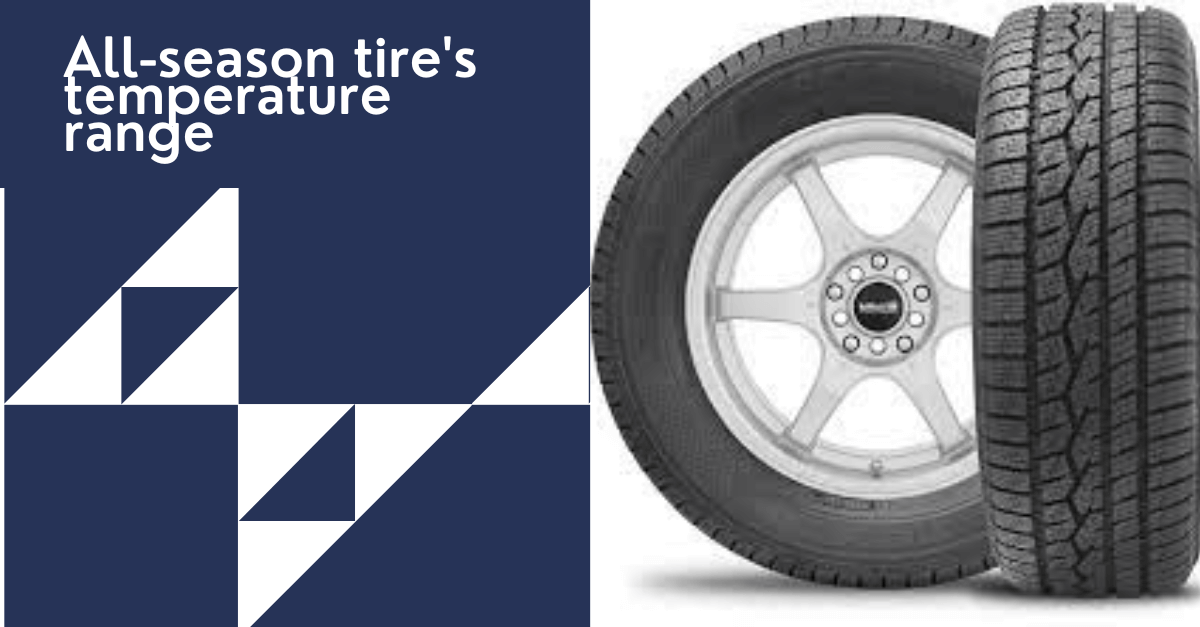Temperature range of all season tire is the matter to discuss or not?
If you find yourself hesitant about the seasonal hassle of changing tires or are simply constrained by budget concerns, fear not, for there exists a versatile solution – All-season Tires.
These tire marvels offer a practical blend of cost-effectiveness and convenience, liberating you from the constant worry of weather fluctuations.
In our exploration of this tire innovation, we delve into the fundamental aspects crucial for understanding their efficacy. From elucidating their definition to examining their suitability across diverse weather conditions.
we aim to provide a comprehensive overview encompassing both advantages and drawbacks.
All-season tire’s temperature range

So, why exactly should you consider all-season tires?
All-season tires, as the name suggests, are engineered to perform admirably in any season.
Drawing upon the best attributes of both summer and winter tires, they feature a tread pattern that strikes a delicate balance with deep enough to ensure traction in winter yet sufficiently shallow to sustain efficiency in summer.
One of the defining characteristics of these tires lies in their specialized composition. Crafted from a premium rubber compound, they exhibit a remarkable adaptability to temperature variations. Remaining supple in cold climates while retaining firmness in warmer conditions, they epitomize resilience and longevity.
Primarily ideal for regions with moderate climates, all-season tires serve as a versatile alternative to their seasonal counterparts. Particularly suited for areas like Europe, where weather fluctuations are relatively mild, they offer a reliable solution catering to varying road conditions.
In essence, all-season tires embody the epitome of adaptability, seamlessly bridging the gap between summer and winter variants. Whether you’re seeking durability, performance, or simply peace of mind, these tires stand poised to deliver, ensuring a smooth and secure driving experience year-round.
Are all-season tires a good alternative to winter tires?
The rubber compound used in the making of all-season tires can adapt to the temperature fast from the ground. Also, these all-season tires come with similar sipes as winter tires.
That is why these tires work similarly to the winter tires and provide you a good traction, grip, flexibility, and unique performance on snow-covered winter roads.
If you are living in such area where the weather is cold but not too freezing and snowfall only happens for a short time or occasionally then these tires will surely be a good alternative for you.
How to identify all-season tires?
Identifying all-season tires may be challenging for you especially when it is your first time. You need to check and consider every detail when it comes to identifying the tire.
Keep notice that all-season tires come with a balanced thread pattern, wide grooves, siping details, and well-optimized thread lines.
These things will help you to identify the all-season tires while going to purchase. If you still have any issues then you can match the tire by using a picture or call any professional.

What is the temperature range of all-season tires?
These tires work well in both low and high temperatures. If you are living in a region where temperature is mostly mild then you can easily use all-season tires.
The recommended range to use all-season tires is above 7 degrees Celsius. It means that these tires are not affected by hot weather but have the chance of effect in the winter season.
Do not get worried because most of the experiences show that all-season tires work well in winter climates unless it is too freezing or drops down.
Benefits of Using All-Season Tires
Yes, all-season tires are not a good option for extreme weather conditions but it does not mean that these tires are bad consideration.
Remember that all-season tires are good to use in any kind of climate except in serious weather conditions. It does not matter whether the serious weather conditions are too hot or too cold.
These tires are the best choice for those who are worried about the changing procedure and cost of purchasing new tires. These tires also provide you a strong grip, traction along efficient performance while driving. Moreover, these tires also save the effort of saving to store the tires.
Disadvantages of using all-season tires
These all-season tires provide too many benefits for a whole year but also lead to some disadvantages. One of them is the end of the temperature spectrum. This is because the different seasonal tires come up with different rubber compounds but all-season tires are made by combining the material of both tires.
Moreover, if the temperature gets below 7 degrees Celsius to freezing then it means that these tires start getting stiffened and reduce all of the handling, performance, and traction on the snow-covered roads.

Which tire should I purchase?
if you are living in a region where the weather is too low like freezing most of the time and roads are covered by snow then you should go ahead with the winter tires.
However, if you are living where the temperature is high most of the time and never too cold then summer tires or all-season tires will be considerable.
Lastly, if you are living in such an area where the temperature is not too low nor too high but mild all around the year then all-season tires will be the right choice for you.
The Bottom Line
That is all about the information about the identification and range of all-season tires. We hope that you are satisfied with this discussion and happy to learn from the best.
In this reading, we tried to clear all of your concepts and doubts about the all-season tires, their usage, qualities along the advantages and disadvantages.
If you want to know the other summer and winter tires too then you can easily land on those pages just by clicking the above-mentioned links. So, why are you standing here? Purchase a desirable tire for yourself and make your journey smoother and easier.
